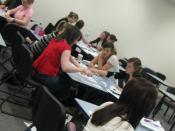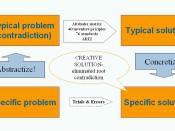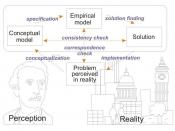PROBLEM SOLVING
TERMS AND TOOLS
COMMUNICATION
Conflicts are often caused by problems in communication. One person may have misunderstood what the other person has said. Or the other person may not have said what they meant to say. Sometimes when we're angry we don't hear what the other person is saying. Sometimes when there is a conflict, people do not tell each other, which causes even more conflict. Good communication skills are an important part of resolving conflicts.
LISTENING
It's important to listen carefully. Your "body talk" sends a message that you are listening. Keeping eye contact, leaning closer, nodding your head when you understand a particular point, and ignoring distractions that are going on around you are some of the ways to send the right body messages.
SUMMARIZE
When a person is finished expressing a thought, summarize the facts and emotions behind what they have said so that they know you have understood what they've said and how they are feeling.
CLARIFY
Ask questions to clarify or make clearer different parts of the problem to make sure that you fully understand the other person's perspective.
GOOD SPEAKING SKILLS
When you speak, try to send a clear message, with a specific purpose, and with respect to the listener. Speak about how you are affected by the problem.
COMMUNICATION SIDETRACKERS
Don't interrupt, criticize, laugh at the other person, offer advice or bring up your own experiences, or change the subject.
WIN-WIN OPTIONS
An idea or suggestion in which both sides can benefit is called a Win-Win option. The idea should help both sides.
BRAINSTORMING
The first step in problem solving is to come up with as many ideas as possible. This is called brainstorming. During this process, any idea that comes to mind should be expressed and written down. Don't judge...


